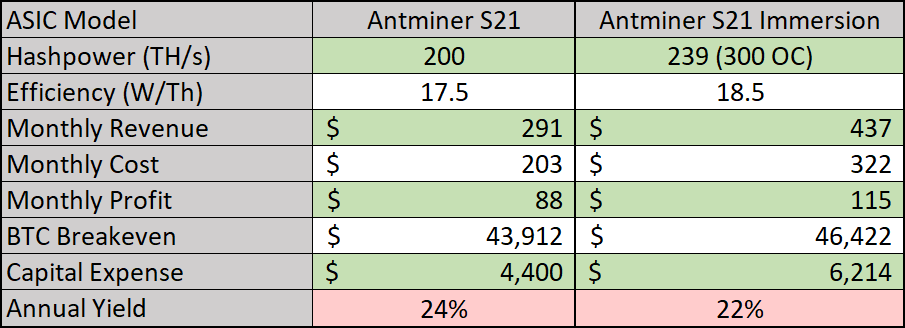Monday Mining Metrics: Immersion vs Air Cooled
Bitcoin Mining Update - 8/26/2024
Immersion Mining vs Air Cooled
The primary operational challenge for Bitcoin miners is heat mitigation. Imagine how hot and loud your laptop gets when you’re running Excel, scrolling Substack, and streaming videos all at the same time. Now imagine how much more heat is produced by Bitcoin mining rigs as they produce trillions of hashes per second - and consume as much energy as 5 residential refrigerators. Keeping these machines cool so they can mine as efficiently as possible is key to success as a miner.
The primary methods of cooling are immersion - which involves submerging the machine in a specialized, oil-based liquid - and air-cooling, which uses fans in and around the machine to keep cool.
Let’s examine the tradeoffs between immersion and air-cooled machines…
Increased Hashpower
Immersion is more thermodynamically effective at keeping ASICs cool which allows them to run at a higher default hashrate. Moreover, immersion ASICs are more capable of overclocking - reaching hashrates even greater than the “faceplate” value.
S21 Immersion: 239 TH/s (up to 300 when overclocked), 18.5 W/T
S21 Air-Cooled: 200 TH/s, 17.5 W/T
During bull markets, hashrate arguably becomes a more important metric than energy efficiency. When BTC is ripping, you want to pour as much gasoline on the fire as possible
Decreased Downtime
Again, due to superior thermodynamics, immersion ASICs are less susceptible to heat-related issues than air-cooled ASICs. This means they are less likely to have to unplug due to overheating. Higher uptime = higher profitability.
Physical Longevity
Increased heat resistance means that immersion ASICs have a longer physical lifespan. ASICs are workhorses - things can break. While hashboard repairs on newer ASICs are often covered by manufacturers, having to send machines to be repaired means it’s not mining and you’re missing out on Bitcoin. Choosing immersion ASICs reduces this possibility.
Trade-Offs:
The most notable trade-off with immersion is the upfront costs. Building immersion infrastructure requires much more upfront capital than air-cooled. Moreover, the price of the machines is also higher. Blockware clients only have to concern themselves with the latter because Blockware provides turnkey hosting services - we sell machines that are already up and running at one of our data centers.
The second trade-off is energy efficiency. Immersion machines are slightly less efficient than their air-cooled counterparts. But the higher hashpower means that during bull markets immersion ASICs are more profitable in spite of the marginal efficiency deficiency.
Profitability Breakdown:
When looking at the details, the S21 & S21 Immersion are very comparable in the current environment. The S21 immersion is netting higher monthly profits, but it is doing so with a slightly higher BTC breakeven cost, and while requiring more upfront investment.
Given the striking similarities in the return profile, the choice between immersion and air-cooled comes down to:
Capital
Risk tolerance for repairs
If you’re willing to deploy more capital upfront and/or you want to decrease the likelihood of machine repairs, then immersion is the way to go.
If you have less capital to deploy and/or you’re not concerned about machine repairs, air-cooled is the way to go.
Blockware Direct ASIC Pricing with Hosting
We have 100s of ASICs available for purchase right now on the Blockware Marketplace! Machines are sold turnkey which means you’ll be hashing as soon as your BTC payment is confirmed on-chain! Click here to start mining today.
For those seeking to purchase ASICs in bulk (with or without hosting), contact sales@blockwaresolutions.com or reach out here. Buying machines in bulk gives you access to better per-unit pricing than buying individual machines!
Contact sales@blockwaresolutions.com or reach out here.
All content is for informational purposes only. This Blockware Intelligence Newsletter is of general nature and does consider or address any individual circumstances and is not investment advice, nor should it be construed in any way as tax, accounting, legal, business, financial or regulatory advice. You should seek independent legal and financial advice, including advice as to tax consequences, before making any investment decision.






